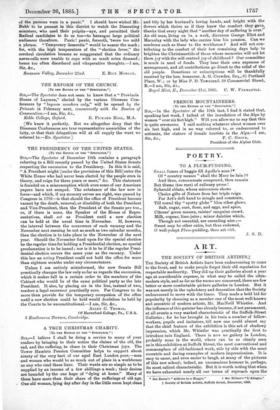THE PRESIDENCY OF THE UNITED STATES.
LTo THE EDITOR OF TRIG "SPECTATOR."] Sia,—The Spectator of December 19th contains a paragraph referring to a Bill recently passed by the United States Senate respecting the succession to the Presidency. In this it is said, "A President might [under the provisions of this Bill] enter the 'White House who had never been elected by the people even in theory, and reign for three years or more," &c. This statement is founded on a misconception which even some of our American papers have not escaped. The substance of the law now in force—and which, if my memory serves me right, was passed by Congress in 1792—is that should the office of President become -vacant by the death, removal, or disability of both the President and Vice-President, then the President of the Senate pro tem., or, if there is none, the Speaker of the House of Repre- sentatives, shall act as President until a new election can be held at the usual time in November. If, however,
the interval between the occurrence of such vacancy and the
November next ensuing be not as much as two calendar months, then the election is to take place in the November of the next -year. Should the November fixed upon for the special election be the regular time for holding a Presidential election, no special proclamation is to be issued ; nor is it to be if the regular Presi- dential election occurs the same year as the vacancy. Under this law an acting President could not hold the office for more than eighteen months under any circumstances.
Unless I am entirely misinformed, the new Senate Bill practically changes the law only so far as regards the succession, which it makes fall in a certain order to the members of the .Cabinet who would be of the same political party as the late President. It also, by placing six in the line, instead of two, renders a legal successor practically sure. For Congress to do more than provide for the temporary occupation of the office until a new election could be held would doubtless be held by the Courts to be unconstitutional—I am, Sir, &c.,
ALLEN C. THOMAS, Of Haverford College, Pa., U.S.A. 3 Eastbourne Terrace, Cambridge.


































 Previous page
Previous page